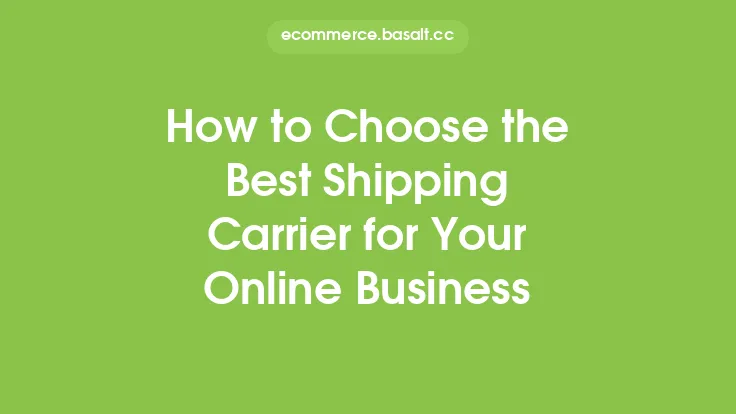Finding reliable suppliers is a crucial step in setting up and running a successful online store. It can be a daunting task, especially for new entrepreneurs who are just starting out in the world of e-commerce. A reliable supplier can make all the difference in ensuring that your products are delivered to customers on time, in good condition, and at a reasonable cost. In this article, we will explore the various ways to find reliable suppliers for your online store, and provide you with some valuable tips and advice to help you make informed decisions.
Understanding Your Supplier Needs
Before you start searching for suppliers, it's essential to understand your needs and requirements. What type of products do you want to sell? What is your budget? What are your quality standards? Answering these questions will help you to narrow down your search and find suppliers that meet your specific needs. You should also consider factors such as shipping costs, lead times, and payment terms. Make a list of your requirements and use it as a checklist when evaluating potential suppliers.
Researching Potential Suppliers
There are several ways to research potential suppliers, including online directories, trade shows, and social media. Online directories such as Alibaba, Thomasnet, and Tradekey can provide you with a list of suppliers from around the world. You can also attend trade shows and industry events to meet suppliers in person and learn more about their products and services. Social media platforms such as LinkedIn and Facebook can also be used to connect with suppliers and learn more about their businesses.
Evaluating Supplier Credentials
When evaluating potential suppliers, it's essential to check their credentials and reputation. Look for suppliers that have a proven track record of delivering high-quality products on time. Check for certifications such as ISO 9001, which indicates that the supplier has a quality management system in place. You should also check for reviews and testimonials from other customers to get an idea of the supplier's reputation. Be wary of suppliers that have poor reviews or no reviews at all.
Assessing Supplier Capabilities
In addition to evaluating a supplier's credentials and reputation, you should also assess their capabilities. What is their production capacity? Can they meet your demand for products? What is their lead time, and can they deliver products on time? You should also ask about their quality control processes and what measures they have in place to ensure that products meet your quality standards.
Communicating with Suppliers
Effective communication is key to building a successful relationship with your suppliers. Make sure you communicate clearly and concisely, and that you understand each other's needs and expectations. Use email, phone, or video conferencing to communicate with suppliers, and make sure you have a clear understanding of their language and cultural differences. Be respectful and professional in your communication, and avoid using jargon or technical terms that may be unfamiliar to the supplier.
Negotiating with Suppliers
Negotiating with suppliers is an essential part of the sourcing process. Be prepared to negotiate on price, payment terms, and delivery times. Do your research and know the market price of the products you are sourcing. Be flexible and willing to compromise, but also be firm and clear about your needs and expectations. Use negotiation tactics such as anchoring, concession, and bundling to get the best deal possible.
Building Relationships with Suppliers
Building strong relationships with your suppliers is crucial to the success of your online store. Take the time to get to know your suppliers, and build trust and rapport with them. Be respectful and professional in your communication, and show appreciation for their products and services. Consider visiting your suppliers in person, or attending industry events to meet them and learn more about their businesses. Building strong relationships with your suppliers can help you to negotiate better prices, improve delivery times, and increase the quality of products.
Managing Supplier Relationships
Managing supplier relationships is an ongoing process that requires regular communication, monitoring, and evaluation. Set clear expectations and goals with your suppliers, and establish a system for tracking and measuring their performance. Use tools such as supplier scorecards, performance metrics, and regular audits to monitor and evaluate supplier performance. Be proactive and address any issues or problems that arise, and work collaboratively with your suppliers to resolve them.
Conclusion
Finding reliable suppliers is a critical component of running a successful online store. By understanding your supplier needs, researching potential suppliers, evaluating supplier credentials, assessing supplier capabilities, communicating effectively, negotiating successfully, building strong relationships, and managing supplier relationships, you can ensure that your online store is stocked with high-quality products that meet your customers' needs. Remember to stay focused on your goals, be flexible and adaptable, and always be willing to learn and improve. With the right suppliers and a well-managed supply chain, you can build a successful and profitable online store that attracts and retains customers.





